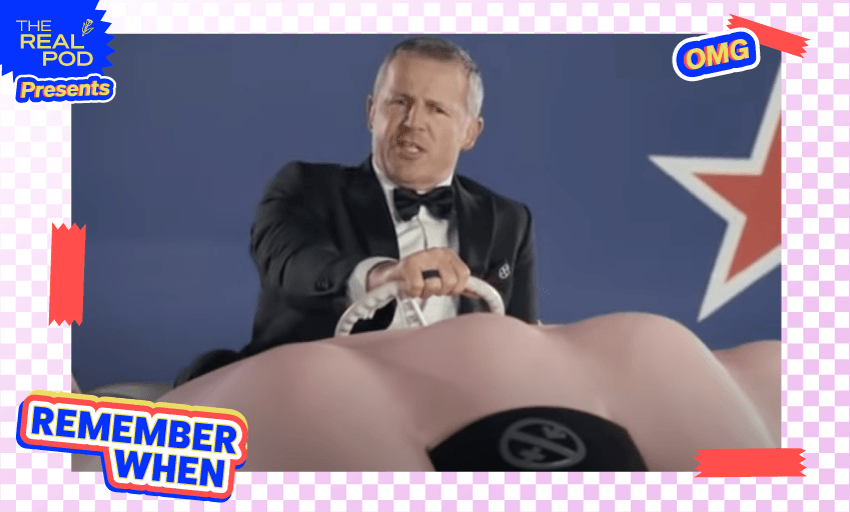
A lighthearted campaign during the last home Rugby World Cup became an international incident. But why? Duncan Greive reexamines Telecom’s ‘Abstain for the Game’ ad.
You have to remember that 2011 was 12 years ago and New Zealand was a very different country. The All Blacks had been the best team in rugby for most of the preceding 24 years, yet hadn’t won a World Cup since the amateur-era debut in 1987. We derived a frankly embarrassing proportion of our self-worth from our men’s rugby team being good at men’s rugby (and none from the fact our women’s rugby team had won four straight World Cups by that stage). This made us, as a country, really weird and tense and grumpy.
And humourless. How else to explain the response to Abstain for the Game? It was just a cute, silly ad campaign, dreamed up by Saatchi and Saatchi as a way for Telecom (soon to be rebranded Spark) to have some fun with the rugby-mania which gripped the nation. Instead of seeing it for the loose, self-effacing idea it manifestly was, the thing basically blew up on contact, becoming a major news story which hit politics, travelled overseas and saw the whole thing dumped in the blink of an eye.
But to look at it now with fresh eyes it feels almost unimaginable that it took on such an enormously controversial dimension. It opens with a long shot of 90s-era All Blacks captain Sean Fitzpatrick, set against an enormous New Zealand flag, rippling softly in the breeze. He’s driving a pink dodgem shaped like a fist, with a black band featuring the male/female symbols on it prominent on the right hand ring finger. Strings play softly in the background as he heads toward the camera, and they will swell markedly as he begins a stirring, Churchillian speech.
“Thank you,” he says, “you’ve taken the first step towards supporting the All Blacks in the great battle of 2011.” It’s a baffling sentence, context-free. Firstly, he’s congratulating you before you have made any commitment, or even know what is being asked of you. Secondly, due to draconian protections around the phrase “Rugby World Cup”, even sponsors which had an official association with teams or stadia were forbidden from even mentioning the cup unless they also had a sponsorship relationship with the tournament. Hence “great battle”.
From there, it gets considerably more strange. Fitzpatrick was an icon of the game, but as he had moved to the UK years earlier also held something of an exotic quality. To hear him speak at all was interesting. This is what he said: that we were “…selflessly stepping into the bed chambers of this fine country, throwing aside your natural instincts, and lacy lingerie”. He raises his eyebrows knowingly.
The music rose and pulsed, almost aroused. “Go forth, wearing your pledge band with pride, averting your eyes from temptation, and shouting from the rooftop ‘Abstain for the Game’.” He continues, rambling in this unhinged, slightly coy style (there’s text in the corner reading “for grown ups only”), before reversing his off little vehicle, and driving off into the distance.
It was an era when new brand campaigns from the major New Zealand corporates were intensely scrutinised pieces of pop culture in their own right, and this one had scarcely aired before becoming perhaps the most reviled ad campaign of the new century. RNZ quoted fellow All Blacks captain Brian Lochore as calling it “crass, disgusting and degrading to all New Zealanders”. It was major news in Australia and was covered in Forbes, Bloomberg and USA Today. Prime minister John Key, ever a sharp reader of public opinion, said “I personally think it’s living proof that not every advertising dollar is worth the money spent”.
The idea was intentionally ludicrous on its face. Previous years had brought reporting and research suggesting that male athletes performed better in competition when they refrained from sex in the leadup to major tournaments. The idea was an extension of the “stadium of four million” concept, whereby New Zealanders would take in abstinence in solidarity with their team. The black rubber ring on the car’s finger was to signal their commitment – Fitzpatrick was also wearing one.
The scale of response essentially forced Telecom’s hand. Within days the blast furnace heat had forced them to apologise and abandon the campaign, torching the vast sums expended on creative and production. It became a symbol of the excesses of the ad industry, and proof that its execs were completely disconnected from the sensibilities of ordinary New Zealanders.
Yet to view it now, three world cups on (two of them resulting in All Black victories) and entirely divorced from the firestorm it set off, the campaign takes on a very different feel. It’s completely bonkers, sure, but very endearingly so. The idea that a brand as huge as Telecom would commit so wholeheartedly to something so massively odd and risky makes your heart swell a little. The execution is so earnest yet unavoidably surreal that it seems humiliating that we took it so seriously.
Perhaps the most comforting aspect with hindsight is that for all the heat, it didn’t impact agency Saatchi and Saatchi’s relationship with Telecom. They would stay together for years to come, and even manage the hugely important rebrand to Spark. It suggests that behind the scenes, both the brand and the agency copped the reaction on the chin, and assumed mutual responsibility and not casting about for someone to blame. That’s as it should be. The campaign was not at fault – it was us all along.
Follow The Real Pod’s Remember When on Apple Podcasts, Spotify or wherever you listen to podcasts.
This post was originally published on this site be sure to check out more of their content.








